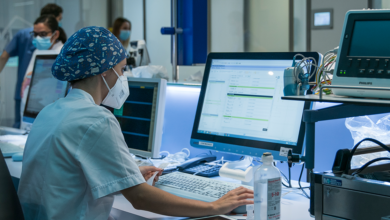What Australian GPs need to consider before adopting AI scribes


The Royal Australian Council of General Practitioners, the peak body for general practice in Australia, has issued guidance for doctors looking to adopt AI transcription technology to assist with clinical documentation.
An AI scribe will record voice from the medical examination to convert to text and enter into the patient’s health record.
WHAT IS IT
The RACGP initially proposed developing a policy for the deployment and use of AI scribes.
As a guide, before deciding to apply one of the above measures, the following should be considered:
-
Evidence of product safety, efficacy and applicability for use in the Australian GP setting
-
Easy to use
-
Time efficiency and impact on clinical workflow
-
Informing patients about the use of AI scribe
-
Ensure patient consent
In addition, the RACGP recommends that GPs consult with their indemnity insurer before purchasing and using an AI recorder. They should also ensure that the technology complies with Australian laws regarding the secure collection and storage of data.
While AI transcription tools are particularly useful in automating clinical documentation, the RACGP warns of its risks.
“GPs should carefully review the output prepared by the AI scribe to look for false positives and negatives and edit the text as required (adding any missing information or omitting incorrect information). GPs can then add their own notes and observations and, in some cases, attach them to the document before signing it.”
WHY IT MATTERS
Australian GPs are said to spend around a tenth of their time each week on practice management, with many also expressing dissatisfaction with the amount of administrative work they are dealing with, according to a recent RACGP survey.
“AI recording tools can reduce the administrative burden on GPs, which contributes significantly to burnout, while improving patient satisfaction, but need to be used with caution,” said Dr Nicole Higgins, Chair of the RACGP, in a statement.
She also stressed that the technology can only serve as a supplement to the tedious work of clinical documentation.
“It is important to understand that AI scribes cannot replace the work of GPs in preparing clinical documentation and doctors must carefully check the accuracy of the output as they may make mistakes.”
MARKET OVERVIEW
Nuance’s Dragon Ambient eXperience Copilot, one of the popular AI-based clinical transcription tools on the market, has recently become available for full integration with widely adopted EMR systems, Epic and Meditech Expanse.
A “Mandarin version” of this technology was recently developed by China Medical University Hospital. The Generative Healthcare Intelligent system also leverages Microsoft Azure OpenAI’s GPT-4 to analyze and summarize speech information from clinicians.
In Australia, starting a business Heidi Health recently raised nearly $7 million in Series A funding for its AI-based clinical productivity tool, which is now used by hundreds of GPs across the country.



